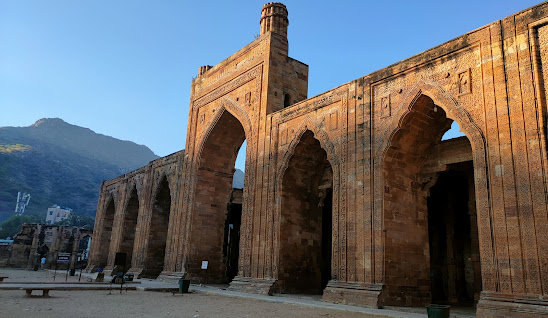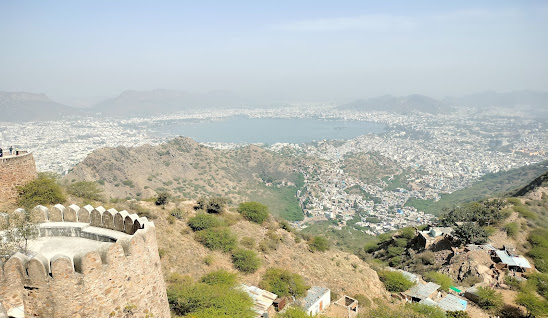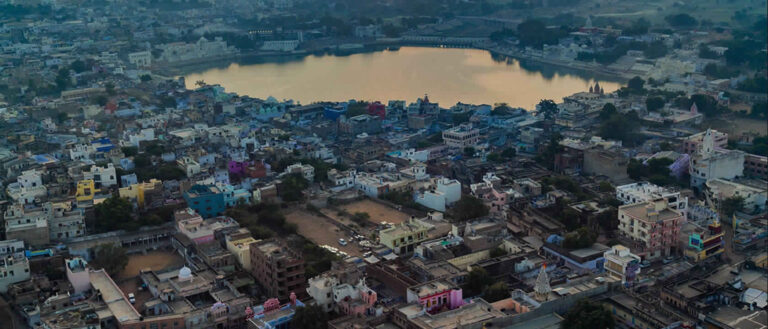Ajmer, which located in the centre of Rajasthan, is a city that perfectly captures the spirit of India’s extensive history, culture, and spirituality. Ajmer is a must-visit location for tourists wanting a thorough immersion in the nation’s varied past because of its spectacular architecture, energetic bazaars, and spiritual monuments. Explore the captivating sights of the city as we learn the secrets that make Ajmer a genuine gem of Rajasthan.
1. The Ajmer Sharif Dargah: A Place of Refuge
The famed Ajmer Sharif Dargah, a Sufi shrine that draws millions of followers from all over the world, is located in the centre of Ajmer. The Sufi saint Khwaja Moinuddin Chishti’s ultimate resting place is the dargah, which has great religious significance for Muslims. Visitors have a profoundly touching experience visiting the dargah because of the serene atmosphere and spiritual energy that permeate the space.


2. Adhai Din Ka Jhonpra: An Architectural Wonder
Adhai Din Ka Jhonpra is a must-see for everyone who enjoys history and architecture. This unusual building, which dates back to the 12th century, exhibits a fusion of Indo-Islamic architectural traditions. Visitors are in awe of its fine craftsmanship and beautiful sculptures. This monument is a highlight of Ajmer’s architectural heritage because of its historical importance and breathtaking beauty.


3. Ana Sagar Lake: Peaceful Surrounded by Nature
At Ana Sagar Lake, you may get away from the busy metropolis and find peace. This charming man-made lake offers a tranquil setting where tourists may unwind and take in the wonders of nature. Sit at the lake’s bank and take in the tranquil ambiance, take a leisurely boat ride, or stroll along the well-kept promenade.


4. Taragarh Fort: A Look Back in Time
Taragarh Fort, perched on a hill, offers stunning all-encompassing views of Ajmer. Stories of bravery and strength from Rajasthan’s illustrious past are preserved in this historic fort. Explore its stunning architecture, meander through its intricate passageways, and consider the magnificence of its former heyday. History buffs will find the fort to be a fascinating site because of its strategic location and historical significance.


5. Pushkar: A Cultural Extravaganza and Pilgrimage
You can reach the enigmatic town of Pushkar, known for its holy lake and the annual Pushkar Camel Fair, by taking a short journey from Ajmer. The famous Brahma Temple, one of the few temples in the world devoted to Lord Brahma, is located in the sacred town. Explore the bustling streets lined with vivid markets, take in the spiritual aura of Pushkar, and take in the lively ceremonies.


6. Local Food: A Delight in Gastronomy
Without partaking in some of the regional cuisine, no trip to Ajmer is complete. Ajmer offers a gourmet adventure that tantalises the taste senses, with dishes like the delectable flavours of Rajasthani thali and the aromatic treats like kachori and lassi. Don’t pass up the chance to sample the city’s distinctive culinary treats and discover the depth of Rajasthani cuisine.


7. Shopping Extravaganza: Ajmer’s Treasures
The vibrant bazaars of Ajmer are a veritable treasure trove of Rajasthani traditional artefacts, textiles, jewellery, and handicrafts. Shop for trinkets, embroidered fabrics, vintage cutlery and fine handcrafted products while strolling around the bustling marketplaces. You may bring a bit of Rajasthan’s history home by shopping in the bustling streets of Ajmer, which are a shoppers’ paradise.


Ajmer is a city that charms tourists with its unique combination of history, spirituality, and cultural diversity. Every nook and cranny of Ajmer has a tale to tell, from the reverent air of the Ajmer Sharif Dargah to the architectural wonders and the serene lakes. It is a location where one may genuinely become immersed in Rajasthan’s essence, witnessing its illustrious past and unwavering spiritual vitality. Travelling to Ajmer is a spiritual experience that leaves travellers with priceless memories and a newfound understanding for India’s rich cultural diversity.



